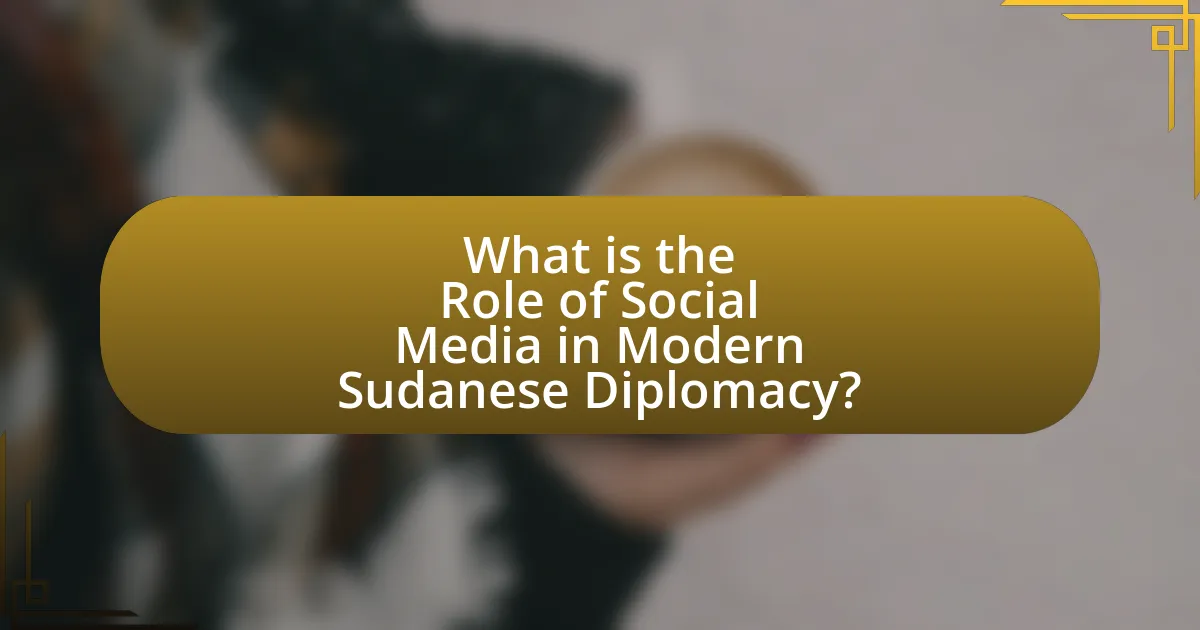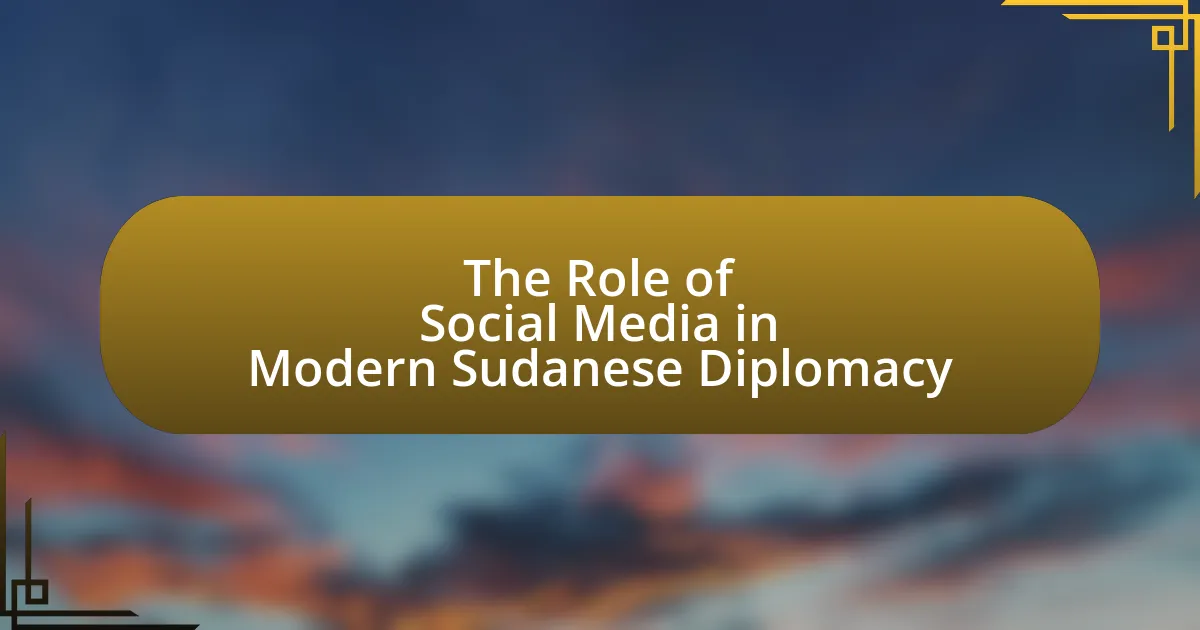The article examines the significant role of social media in modern Sudanese diplomacy, highlighting how platforms like Twitter and Facebook facilitate direct communication between the government and the public, enhance international engagement, and promote transparency. It discusses the transformation of diplomatic practices in Sudan, particularly during events like the 2019 revolution, where social media was pivotal in mobilizing support and shaping public discourse. The article also addresses the challenges faced by Sudan in utilizing social media, including internet access limitations and government censorship, while emphasizing the importance of these platforms in influencing public opinion and shaping Sudan’s global image. Additionally, it explores strategies for effective engagement with the Sudanese diaspora and best practices for leveraging social media in diplomatic efforts.

What is the Role of Social Media in Modern Sudanese Diplomacy?
Social media plays a crucial role in modern Sudanese diplomacy by facilitating direct communication between the government and the public, as well as enhancing international engagement. The Sudanese government utilizes platforms like Twitter and Facebook to disseminate information, promote its policies, and respond to global events in real-time. This approach allows for greater transparency and public involvement in diplomatic discussions, which is essential in a country with a history of political unrest. Additionally, social media enables Sudan to shape its narrative on the international stage, counter misinformation, and build relationships with foreign entities, thereby influencing diplomatic outcomes.
How has social media transformed diplomatic practices in Sudan?
Social media has transformed diplomatic practices in Sudan by enabling real-time communication and engagement between the government and citizens, as well as facilitating international dialogue. This shift has allowed Sudanese officials to disseminate information quickly, respond to public sentiment, and engage with foreign diplomats and organizations more effectively. For instance, during the 2019 Sudanese revolution, platforms like Twitter and Facebook played crucial roles in mobilizing protests and sharing information globally, which pressured the government and influenced international responses. The increased visibility and accessibility of diplomatic communications through social media have thus reshaped how Sudan interacts both domestically and internationally.
What specific platforms are most influential in Sudanese diplomacy?
Twitter and Facebook are the most influential platforms in Sudanese diplomacy. These social media platforms facilitate real-time communication and engagement between Sudanese officials and the international community. For instance, during the 2019 Sudanese revolution, Twitter was instrumental in mobilizing support and disseminating information globally, showcasing its role in shaping diplomatic narratives. Additionally, Facebook serves as a platform for public discourse, allowing diplomats to gauge public sentiment and respond accordingly, further emphasizing its significance in modern Sudanese diplomatic efforts.
How do these platforms facilitate communication between diplomats and the public?
Social media platforms facilitate communication between diplomats and the public by providing direct channels for information dissemination and engagement. These platforms allow diplomats to share updates, policies, and initiatives in real-time, fostering transparency and accessibility. For instance, the Sudanese Ministry of Foreign Affairs utilizes Twitter and Facebook to communicate official statements and respond to public inquiries, enhancing interaction and building trust with citizens. This direct engagement is supported by statistics showing that over 70% of the Sudanese population uses social media, making it an effective tool for outreach and dialogue.
Why is social media important for Sudan’s international relations?
Social media is important for Sudan’s international relations because it facilitates real-time communication and engagement with global audiences. This platform allows Sudan to share its narratives, promote its interests, and counter misinformation, thereby shaping its international image. For instance, during the 2019 Sudanese revolution, social media played a crucial role in mobilizing support and drawing international attention to the country’s political changes, which influenced foreign diplomatic responses and aid.
What role does social media play in shaping Sudan’s global image?
Social media significantly influences Sudan’s global image by providing a platform for real-time communication and engagement with international audiences. This digital presence allows Sudan to showcase its culture, political developments, and social issues, countering negative stereotypes and fostering a more nuanced understanding of the country. For instance, during the 2019 Sudanese revolution, social media was pivotal in mobilizing support and disseminating information globally, which garnered international attention and sympathy for the protesters. This visibility helped reshape perceptions of Sudan from a nation often associated with conflict to one striving for democratic reform and human rights.
How does social media influence public opinion on foreign policy in Sudan?
Social media significantly influences public opinion on foreign policy in Sudan by providing a platform for real-time information dissemination and public engagement. This influence is evident as citizens utilize platforms like Facebook and Twitter to express their views, mobilize support, and challenge government narratives regarding foreign relations. For instance, during the 2019 Sudanese revolution, social media played a crucial role in shaping public discourse and rallying international attention, which pressured the government to reconsider its foreign policy decisions. The rapid spread of information and the ability to organize protests through social media have empowered Sudanese citizens, making their opinions more visible and impactful in the realm of foreign policy.
What challenges does Sudan face in utilizing social media for diplomacy?
Sudan faces significant challenges in utilizing social media for diplomacy, primarily due to limited internet access and government censorship. Approximately 60% of the population has internet access, which restricts the reach of diplomatic messages. Additionally, the Sudanese government has a history of controlling online discourse, often blocking social media platforms during political unrest, as seen during the protests in 2019. This censorship undermines the effectiveness of social media as a diplomatic tool, limiting engagement with both domestic and international audiences. Furthermore, misinformation and a lack of digital literacy among the populace complicate the communication landscape, making it difficult for Sudan to present a coherent diplomatic narrative.
What are the risks of misinformation on social media for diplomatic efforts?
Misinformation on social media poses significant risks to diplomatic efforts by undermining trust, escalating tensions, and distorting public perception. For instance, false narratives can lead to misinterpretations of a country’s intentions, resulting in diplomatic conflicts or breakdowns in negotiations. A study by the Pew Research Center found that 64% of Americans believe misinformation has a major impact on public opinion, which can directly influence diplomatic relations. Additionally, misinformation can provoke public outrage or support for aggressive policies, as seen in various international incidents where social media amplified false claims, leading to heightened geopolitical tensions.
How do government regulations impact social media use in diplomacy?
Government regulations significantly shape social media use in diplomacy by establishing guidelines that dictate how diplomatic entities can engage online. These regulations can restrict or promote the dissemination of information, influencing the speed and manner in which diplomatic messages are communicated. For instance, in Sudan, the government has implemented laws that control internet access and social media platforms, which directly affects how diplomats can interact with both domestic and international audiences. Such regulations can lead to censorship, limiting the ability of diplomats to share information freely, thereby impacting the effectiveness of their communication strategies.
How does social media enhance engagement with the Sudanese diaspora?
Social media enhances engagement with the Sudanese diaspora by providing a platform for real-time communication and community building. This digital connectivity allows Sudanese individuals abroad to share experiences, cultural heritage, and news, fostering a sense of belonging and identity. For instance, platforms like Facebook and Twitter enable the dissemination of information regarding political developments and social issues in Sudan, which keeps the diaspora informed and involved. Additionally, social media facilitates networking opportunities, allowing members of the Sudanese diaspora to connect with each other and with organizations that support their interests, thus strengthening their collective voice and influence in matters related to Sudan.
What strategies are used to connect with Sudanese citizens abroad via social media?
Sudanese diplomatic entities utilize targeted social media campaigns, community engagement, and information dissemination to connect with Sudanese citizens abroad. These strategies include creating official social media accounts on platforms like Facebook, Twitter, and Instagram to share updates, cultural content, and resources relevant to the diaspora. Additionally, they often host virtual events and discussions to foster community involvement and address the concerns of Sudanese citizens living overseas. The effectiveness of these strategies is supported by the increasing number of Sudanese citizens engaging with their embassies online, reflecting a growing reliance on digital communication for maintaining ties with their homeland.
How does the diaspora influence Sudan’s diplomatic initiatives through social media?
The Sudanese diaspora significantly influences the country’s diplomatic initiatives through social media by amplifying voices, mobilizing support, and shaping public opinion. This influence is evident as diaspora communities utilize platforms like Twitter and Facebook to advocate for political change, share information about Sudan’s international standing, and engage with global audiences. For instance, during the 2019 Sudanese revolution, diaspora activists effectively used social media to raise awareness and garner international support, which pressured foreign governments to take a stance on Sudan’s political situation. This demonstrates that the diaspora not only contributes to the narrative surrounding Sudan’s diplomacy but also plays a crucial role in facilitating communication between Sudanese citizens and the international community.
What are the best practices for leveraging social media in Sudanese diplomacy?
The best practices for leveraging social media in Sudanese diplomacy include strategic engagement, targeted messaging, and real-time communication. Strategic engagement involves identifying key stakeholders and influencers within the Sudanese context to foster relationships and dialogue. Targeted messaging ensures that content resonates with specific audiences, addressing their concerns and interests, which is crucial given Sudan’s diverse population and political landscape. Real-time communication allows for immediate responses to events and public sentiment, enhancing the government’s responsiveness and transparency. For instance, during the 2019 Sudanese revolution, social media played a pivotal role in mobilizing support and disseminating information, demonstrating its effectiveness in diplomatic outreach and public engagement.
How can diplomats effectively use social media to communicate their messages?
Diplomats can effectively use social media to communicate their messages by leveraging platforms to engage directly with the public and stakeholders, ensuring transparency and immediacy in their communications. By utilizing tools such as Twitter for real-time updates and Facebook for in-depth discussions, diplomats can reach a broader audience and foster dialogue. For instance, the U.S. State Department has successfully used social media campaigns to promote initiatives and respond to global events, demonstrating the effectiveness of this approach in shaping public perception and policy discussions.
What tools and techniques can enhance social media engagement in diplomacy?
Social media engagement in diplomacy can be enhanced through tools such as analytics platforms, content management systems, and interactive features like polls and live Q&A sessions. Analytics platforms, like Hootsuite and Sprout Social, allow diplomats to track engagement metrics, understand audience demographics, and tailor content accordingly, which is crucial for effective communication. Content management systems, such as Buffer, facilitate the scheduling and dissemination of posts across multiple platforms, ensuring consistent messaging. Interactive features, including polls and live Q&A sessions, foster real-time engagement and allow diplomats to address public concerns directly, thereby building trust and transparency. These techniques have been shown to increase audience interaction and improve the overall effectiveness of diplomatic messaging, as evidenced by successful campaigns from various diplomatic missions that utilized these tools to engage with their constituents effectively.

Leave a Reply